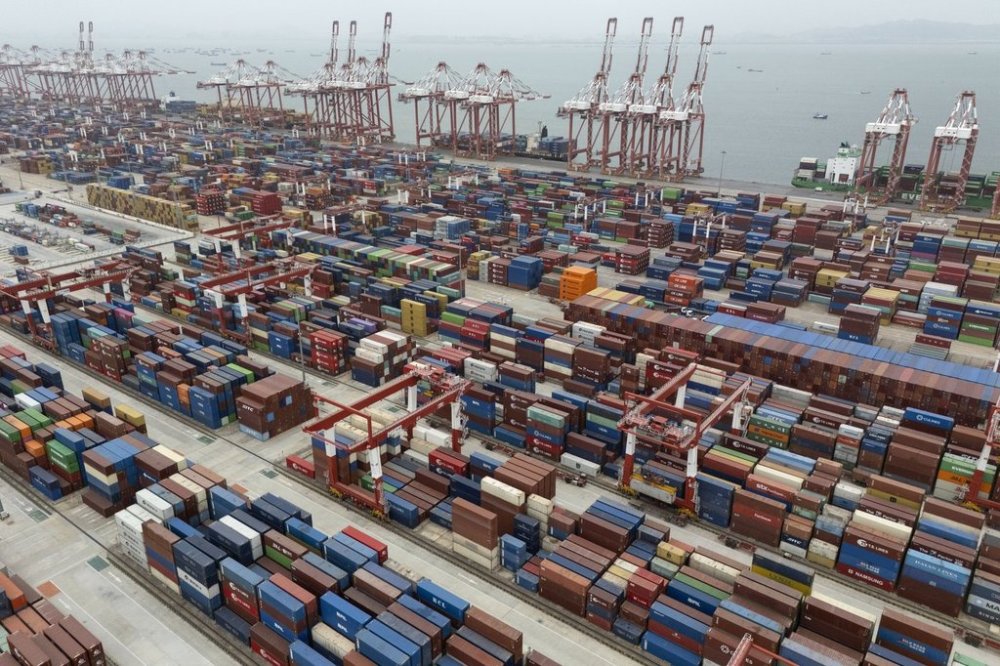World
Shipping Industry Pushes for Global Greenhouse Gas Fees

Nearly 200 shipping companies have urged the world’s largest maritime nations to adopt regulations that would establish the first-ever global fee on greenhouse gas emissions. This initiative aims to significantly reduce emissions from the shipping sector. The call for action comes from the Getting to Zero Coalition, an alliance that includes various companies, governments, and intergovernmental organizations. They are asking member states of the International Maritime Organization (IMO) to support these regulations during a meeting scheduled in London from October 14 to 17, 2023.
The momentum for this proposal highlights the importance of industry voices in advocating for climate action. Jesse Fahnestock, who oversees decarbonization efforts at the Global Maritime Forum, stated, “Given the significance of the political decision being made, we think it is important that industry voices in favor of this adoption be heard.” As the forum that manages the coalition, they are keen to ensure that the push for green shipping is recognized.
The proposal has met significant resistance from the administration of former U.S. President Donald Trump, which has labeled it as a potential “global carbon tax.” In a joint statement, U.S. Secretaries of State, Commerce, Energy, and Transportation expressed their firm opposition, warning that they would retaliate if other nations supported the initiative. They accused the proposed regulatory framework of being an unwarranted burden on American shipping companies, claiming it would lead to increased costs and benefit competitors like China.
Despite this opposition, many shipping companies within the United States have publicly supported the initiative. The Chamber of Shipping of America emphasized the need for a unified global system, rather than fragmented regional frameworks that could impose multiple charges based on shipping routes. Kathy Metcalf, the chamber’s president emeritus, stressed the importance of creating a single regulatory environment that would streamline compliance and reduce costs.
The shipping industry is under increasing scrutiny, with emissions climbing to approximately 3% of global totals as larger vessels transport more cargo while consuming substantial amounts of fossil fuels. The IMO has set an ambitious target for the sector to achieve net-zero greenhouse gas emissions by around 2050. To facilitate this transition, the organization is committed to increasing the use of fuels that have zero or near-zero emissions.
In April 2023, IMO member states agreed on the framework for a regulatory system that would impose a minimum fee on greenhouse gases emitted by ships exceeding certain thresholds. This initiative also includes a marine fuel standard aimed at phasing in cleaner alternatives. The framework will require a vote, as consensus has not been fully achieved, with the United States notably absent from the discussions.
The timeline for the regulations to take effect is crucial, as they are set to be enforced by 2027 if approved. These rules would primarily impact large ocean-going vessels over 5,000 gross tonnage, which account for approximately 85% of the total carbon emissions from international shipping. Delaine McCullough, president of the Clean Shipping Coalition and director of the Ocean Conservancy shipping program, warned that failure to agree could delay decarbonization efforts significantly, jeopardizing the shipping sector’s ability to contribute to global climate goals.
The U.S. Secretaries also indicated that fellow IMO members should expect a strong response from the United States if they proceed without its support. They expressed concerns that the proposed fuel standards would impose unattainable targets on shipping companies, ultimately driving up costs and favoring countries that are advancing in cleaner fuel production, such as China.
While the U.S. stance presents challenges, the prevailing view among many nations appears to favor the proposed regulations. Faig Abbasov from Transport and Environment, a Brussels-based environmental NGO, noted that while the April agreement may not have been ambitious enough, it represents a significant opportunity for initiating the decarbonization of the shipping sector, which can be further strengthened.
Shipping companies are advocating for these regulations, believing they will provide the necessary certainty to invest in cleaner technologies, including alternative fuels and the ships designed to utilize them. Alongside the Getting to Zero Coalition, the International Chamber of Shipping, which represents over 80% of the world’s merchant fleet, is also pressing for the adoption of these measures at the upcoming IMO meeting.
As the shipping industry grapples with its environmental impact, the outcome of this meeting could set a critical precedent for future regulations aimed at achieving sustainability in global trade.
-

 World4 months ago
World4 months agoScientists Unearth Ancient Antarctic Ice to Unlock Climate Secrets
-

 Entertainment4 months ago
Entertainment4 months agoTrump and McCormick to Announce $70 Billion Energy Investments
-

 Lifestyle4 months ago
Lifestyle4 months agoTransLink Launches Food Truck Program to Boost Revenue in Vancouver
-

 Science4 months ago
Science4 months agoFour Astronauts Return to Earth After International Space Station Mission
-

 Technology2 months ago
Technology2 months agoApple Notes Enhances Functionality with Markdown Support in macOS 26
-

 Top Stories3 weeks ago
Top Stories3 weeks agoUrgent Update: Fatal Crash on Highway 99 Claims Life of Pitt Meadows Man
-

 Sports4 months ago
Sports4 months agoSearch Underway for Missing Hunter Amid Hokkaido Bear Emergency
-

 Politics3 months ago
Politics3 months agoUkrainian Tennis Star Elina Svitolina Faces Death Threats Online
-

 Politics4 months ago
Politics4 months agoCarney Engages First Nations Leaders at Development Law Summit
-

 Technology4 months ago
Technology4 months agoFrosthaven Launches Early Access on July 31, 2025
-

 Top Stories1 week ago
Top Stories1 week agoFamily Remembers Beverley Rowbotham 25 Years After Murder
-

 Top Stories4 days ago
Top Stories4 days agoBlake Snell’s Frustration Ignites Toronto Blue Jays Fan Fury





















